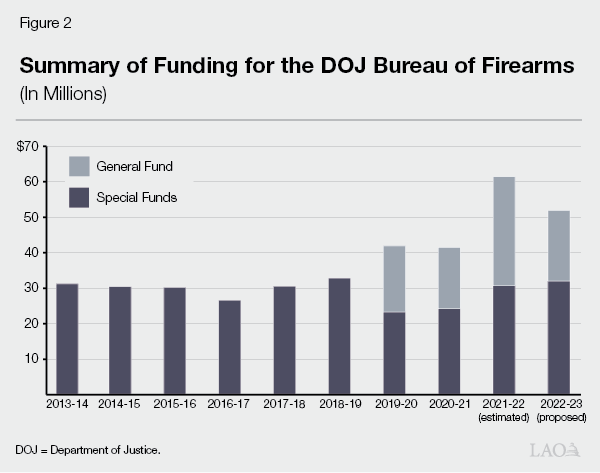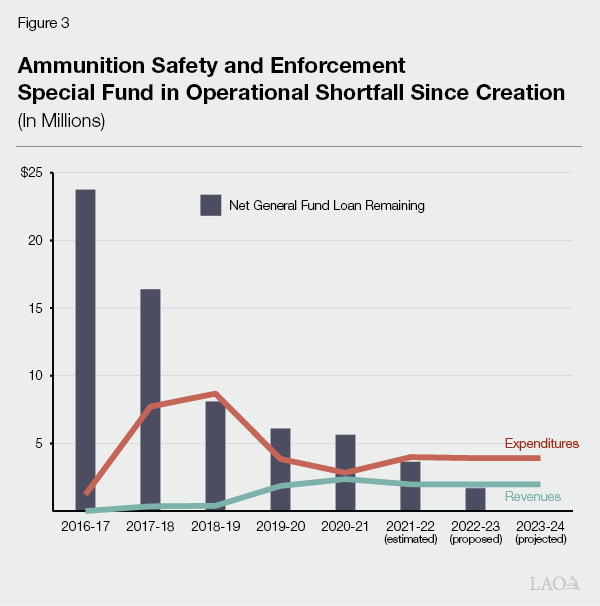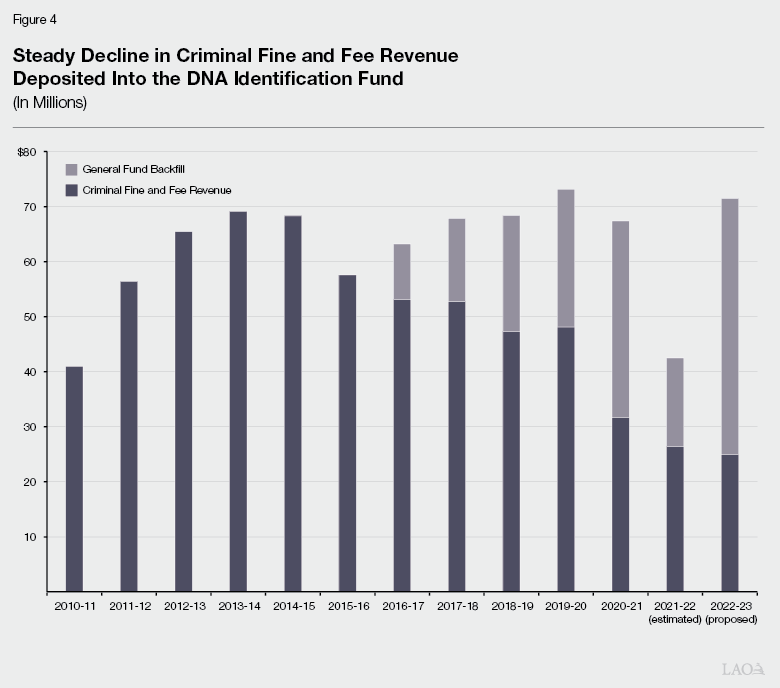LAO Contact
February 11, 2022
The 2022-23 Budget
Department of Justice Proposals
Summary. This post provides our findings and recommendations on two of the Governor’s budget proposals related to the Department of Justice (DOJ)—(1) provisional language to provide additional General Fund support, if needed, to the Ammunition Safety and Enforcement Special Fund which supports the DOJ Ammunition Purchase Authorization Program and (2) a $46.4 million one‑time General Fund backfill of the DNA Identification Fund which supports DOJ’s Bureau of Forensic Services and provisional language for additional General Fund support, if needed. Two other budget proposals related to DOJ, specifically to support the new Organized Retail Crime Enterprises teams and to maintain DOJ’s Task Force Program, are discussed in a forthcoming publication.
Overview
Under the direction of the Attorney General, DOJ provides legal services to state and local entities, brings lawsuits to enforce public rights, and carries out various law enforcement activities. DOJ also provides various services to local law enforcement agencies, including providing forensic services to local law enforcement agencies in jurisdictions without their own crime laboratory. In addition, the department manages the statewide criminal history database and conducts background checks required for firearm and ammunition purchase as well as other purposes.
As shown in Figure 1, the Governor’s budget proposes $1.2 billion to support DOJ operations in 2022‑23—an increase of $40 million (or 3.4 percent)—over the revised amount for 2021‑22. About half of the proposed funding supports DOJ’s Division of Legal Services, while the remainder supports the Division of Law Enforcement and the California Justice Information Services Division. Of the total amount proposed for DOJ operations in 2022‑23, around one‑third—$433 million—is from the General Fund. This is an increase of $37 million (or 9.5 percent) from the estimated 2021‑22 General Fund amount.
Figure 1
Department of Justice Budget Summary
(Dollars in Millions)
|
2020‑21 |
2021‑22 |
2022‑23 |
Change From 2021‑22 |
||
|
Amount |
Percent |
||||
|
Legal Services |
$498 |
$585 |
$604 |
$19 |
3.3% |
|
Law Enforcement |
218 |
307 |
337 |
30 |
9.9 |
|
California Justice Information Services |
228 |
259 |
250 |
‑10 |
‑3.8 |
|
Totals |
$944 |
$1,151 |
$1,191 |
$40 |
3.4% |
Ammunition Safety and Enforcement Special Fund
Background
Firearms and Ammunition Regulation. Under federal and/or state law, certain individuals are not permitted to own firearms and ammunition. Such “prohibited persons” include individuals (1) convicted of felonies and some misdemeanors (such as assault), (2) found by a court to be a danger to themselves or others due to mental illness, and (3) with a restraining order against them. Additionally, federal and state law include various regulations related to firearms and ammunition. This includes background checks when purchasing firearms and ammunition to ensure the purchaser is not a prohibited person, a ten‑day waiting period before a dealer may give a firearm to a buyer, and requirements for the recording and reporting of firearm and ammunition sales.
DOJ’s Bureau of Firearms (BOF) is the primary entity for ensuring compliance with federal and state law. This includes processing background checks, licensing vendors, inspecting vendors, and seizing firearms and ammunition from individuals who are no longer permitted to own or possess them. As shown in Figure 2, BOF activities have generally been supported by various special funds that primarily receive revenue from various fees (such as fees charged when an individual purchases a firearm). Funding for BOF enforcement teams that seize firearms and ammunition from prohibited persons shifted from special funds to the General Fund beginning in 2019‑20. The Governor’s 2022‑23 budget includes $52 million to support BOF—$20 million from the General Fund and $32 million from various special funds. (We note that the 2021‑22 budget included a one‑time $10.3 million General Fund augmentation for grants to county sheriff offices to assist with the removal of firearms and ammunition from prohibited persons.)

Proposition 63 (2016) and Chapter 55 of 2016 (SB 1235, De León). Proposition 63—as amended by Chapter 55—implemented various state laws related to the regulation of firearms and ammunition. With certain exceptions, this included requiring DOJ‑licensed ammunition vendors to check with DOJ at the time of sale to ensure the purchaser is not a prohibited person and to collect and report certain information (such as the date of sale and the purchaser’s identification information) to DOJ. Proposition 63 and Chapter 55 authorized DOJ to charge fees to cover its reasonable regulatory and enforcement costs related to ensuring purchasers are authorized to buy ammunition (also known as the “Ammunition Purchase Authorization Program”)—most notably specifying an ammunition purchase fee of up to $1 per transaction (which DOJ is authorized to adjust for inflation). Such fees are required to be deposited into the Ammunition Safety and Enforcement Special Fund and continuously appropriated to support the Ammunition Purchase Authorization Program.
Additionally, Proposition 63 and Chapter 55 (1) appropriated $25 million one‑time General Fund as a start‑up loan for the Ammunition Purchase Authorization Program and (2) required that Ammunition Safety and Enforcement Special Fund revenues—after deducting DOJ costs—be transferred to the General Fund to repay the loan. Finally, Proposition 63 specified that its provisions could be amended by the Legislature as long as the changes are consistent with and further its intent.
Consistent Operational Shortfall Since Creation of Ammunition Safety and Enforcement Special Fund. As shown in Figure 3, expenditures from the Ammunition Safety and Enforcement Special Fund—which is one of the special funds that supports BOF operations—have regularly exceeded revenues since the fund was established. This was expected in the first few years as DOJ would need to incur certain one‑time costs—such as updating its existing databases—to allow for the Ammunition Purchase Authorization Program to begin operations in July 2019 (as required by Proposition 63 and Chapter 55). The General Fund loan mentioned above was thus used to address these operational shortfalls. However, as shown in the figure, projections indicate that the balance of the General Fund loan will reach zero by 2023‑24—resulting in the insolvency of the Ammunition Safety and Enforcement Special Fund. This insolvency prevents any repayment of the start‑up General Fund loan.

Governor’s Proposal
The Governor’s budget proposes provisional budget language authorizing the Director of the Department of Finance to transfer any amount of General Fund to the Ammunition Safety and Enforcement Special Fund if there are insufficient revenues in the fund to support the Ammunition Purchase Authorization Program in 2022‑23. This transfer could only occur 30 days after written notification to the Legislature.
Assessment
Additional Resources Could Be Needed in Budget Year to Maintain Ammunition Purchase Authorization Program. Under current projections, the Ammunition Safety and Enforcement Special Fund is expected to end 2022‑23 with a fund balance of $1.7 million. This represents about 88 percent of annual projected revenues or 44 percent of annual projected expenditures. However, this fund balance could potentially be reduced, and even eliminated, if (1) revenues are ultimately lower or (2) expenditures are higher than expected in 2021‑22 and 2022‑23. As such, additional resources could be needed in the budget year to maintain Ammunition Purchase Authorization Program service levels.
Proposal Lacks Long‑Term Solution to Address Ongoing Operational Shortfalls. The Governor’s proposal lacks a long‑term solution to address the ongoing operational shortfalls in the Ammunition Safety and Enforcement Special Fund. Revenues are averaging around $2 million annually, while expenditures have ranged between $3 million to $4 million annually. (We note that it is unclear the specific impact, if any, the pandemic may have had upon ammunition transactions which would impact both revenues and expenditures.) Absent any DOJ changes to its operations, this means that operational shortfalls in the Ammunition Safety and Enforcement Special Fund will persist.
Recommendations
Modify Proposal to Provide General Fund Transfer as Loan. We recommend the Legislature modify the Governor’s proposal to ensure that any General Fund resources provided to the Ammunition Safety and Enforcement Special Fund be provided as a loan. While we find it reasonable to provide resources to prevent decreased service levels in the Ammunition Purchase Authorization Program, the intent of Proposition 63 and Chapter 55 was for fee revenues to cover the state’s reasonable regulatory and enforcement costs related to ammunition purchases. As such, the additional General Fund resources should be provided as a loan—consistent with the $25 million start‑up loan authorized in 2016.
Change State Law to Increase Ammunition Purchase Transaction Fee. We recommend the Legislature change state law to increase the ammunition purchase transaction fee. Such a fee increase will likely be needed in the future to address the Ammunition Safety and Enforcement Special Fund’s operational shortfalls and avoid insolvency. Consistent with Proposition 63 and Chapter 55, such a fee increase would ensure that there are sufficient revenues to pay for DOJ’s costs for operating the Ammunition Purchase Authorization Program. We note that such a fee increase would require 55 percent approval by each house in the Legislature as well as the Governor’s signature.
The Legislature has various options when considering the fee increase. When weighing these options, there are various factors for consideration. Such factors include: (1) the maximum per transaction fee desired, (2) how quickly the $25 million General Fund start‑up loan should be repaid, and (3) when the desired fee increase should take effect. For example, if a fee increase goes into effect quickly, it is possible that the Governor’s proposal may not be needed. Some potential options for increasing fees include:
- Increasing the ammunition transaction fee by $2 (for a total $3 fee) could address the Ammunition Safety and Enforcement Special Fund’s operational shortfall and provide sufficient resources to address minor fluctuations in revenues or expenditures. Some revenues might even be available to begin repaying the General Fund start‑up loan.
- Increasing the ammunition transaction fee by $3 (for a total $4 fee) could provide sufficient resources to cover DOJ Ammunition Purchase Authorization Program costs and potentially generate sufficient revenues to repay the General Fund start‑up loan within the next 15 years.
- Increasing the ammunition transaction fee by $5 (for a total $6 fee) could provide sufficient resources to cover DOJ Ammunition Purchase Authorization Program costs and potentially generate sufficient revenues to repay the General Fund start‑up loan within the next five years.
We note that fee increases can impact purchaser behavior—for example, significantly higher fees can result in individuals buying more in one transaction which could then impact the total amount of revenue collected annually—which is difficult to predict. The above options assume little change in purchaser behavior.
DNA Identification Fund Backfill
Background
Overview of Bureau of Forensic Services (BFS). BFS provides criminal laboratory services—such as DNA testing, alcohol and controlled substances analysis, and on‑site crime scene investigative support. Ten regional laboratories provide services at no charge for local law enforcement and prosecutorial agencies in 46 counties that do not have access to those services. BFS also assists the 12 counties and 8 cities that operate their own laboratories where BFS offers services their laboratories lack. (Local agencies also contract with private or other governmental laboratories for services.) Additionally, BFS operates the state’s DNA laboratory as well as the state’s criminalistics training institute.
BFS Funding Sources. BFS receives support from various sources, but primarily from the DNA Identification Fund—a state special fund that receives criminal fine and fee revenue—and the state General Fund. As shown in Figure 4, the amount of revenue deposited into the DNA Identification Fund has steadily declined since 2013‑14. To help address this steady decline and to maintain BFS services levels, the state has provided General Fund support to backfill the DNA Identification Fund since 2016‑17.

Report on Alternative Ways to Fund BFS Forthcoming. The 2021‑22 budget package required DOJ submit a report by March 10, 2022 that identifies various options—other than the state General Fund—to support BFS annual operations. The budget specifically required DOJ consider an option that would require sharing costs with local agencies that make use of BFS services based on the specific type of forensic services sought, the speed of the service, the size of the agency, and any other factors DOJ chooses to include. As of the time of this publication, DOJ reports that it is on track to submit this report by the specified deadline.
Governor’s Proposal
The Governor’s budget proposes $46.4 million one‑time General Fund to backfill the DNA Identification Fund in 2022‑23. The proposal also includes provisional budget language authorizing the Director of the Department of Finance to transfer additional General Fund to the DNA Identification Fund if revenues deposited into the fund decline further and are insufficient to support BFS. This transfer can only occur after 30 day written notification to the Legislature.
Assessment
Proposal Addresses DNA Identification Fund Shortfall in 2022‑23. The Governor’s proposal would address the projected DNA Identification Fund shortfall in the budget year and would maintain existing BFS service levels. We would note that the 2021‑22 budget included provisional budget language allowing the Director of the Department of Finance to provide additional General Fund to backfill the DNA Identification Fund if revenues decline further. As shown in Figure 4, tens of millions of dollars could be needed if fine and fee revenues are not higher than currently projected for 2021‑22.
Proposal Does Not Address Long‑Term Fund Solvency. The Governor’s proposal does not address the long‑term solvency of the DNA Identification Fund. Because of the steady decline in criminal fine and fee revenue, BFS expenditures exceed estimated revenues by millions of dollars annually. Because the DNA Identification Fund will effectively have no fund balance at the end of 2022‑23, this means that this fund is insolvent.
BFS Provides Certain Local Governments Substantial Benefits. City and county law enforcement and prosecutorial agencies are predominantly responsible for collecting and submitting forensic evidence for testing as well as using the evidence to pursue criminal convictions in court. However, certain counties and cities benefit significantly more than others. Specifically, while 12 counties and 8 cities currently use their own resources to support local criminal laboratories, 46 counties generally do not have to use any of their resources for criminal laboratory services. This is because BFS is effectively subsidizing the agencies in these counties with tens of millions of dollars in services annually.
Local Governments Lack Incentive to Use BFS Services Cost‑Effectively. BFS’s current funding structure provides the agencies it serves with little incentive to use its services in a cost‑effective manner. Since BFS does not charge for its services, these local agencies lack incentive to prioritize what forensic evidence is collected and submitted for testing. Their submissions instead are generally only limited by BFS’s overall capacity and service levels, as determined by the amount of funding provided to the bureau in the annual state budget. In contrast, counties and cities that use their own resources to support their labs—or those that decide they want to pay a private laboratory for testing—have greater incentive to carefully prioritize what evidence should be tested and how quickly it should be done.
Recommendations
Require Local Governments to Partially Support BFS Beginning in 2023‑24. Given the substantial benefit that local agencies receive from BFS services, we recommend the Legislature require local governments to partially support BFS beginning in 2023‑24. We also recommend the Legislature provide DOJ with direction on how much of BFS operation revenues should come from local agencies (such as one‑third or one‑half). This would generally reduce the amount of General Fund needed to support BFS costs on an ongoing basis. Additionally, this would also be more equitable than the existing system in which certain local governments receive services at no charge, while others pay to operate their own laboratories.
Under our recommendation, agencies that receive service from BFS would be required to pay for a portion of the services they receive—providing greater incentive to prioritize workload to DOJ. DOJ would have flexibility in calculating each local agency’s share of the BFS services it uses—including operation and facility costs—based on consultation with stakeholders and after considering various factors (including equity concerns). For example, DOJ could require local agencies pay more or less based on various factors—such as the specific type of forensic service sought, the speed of the service, or the size of the agency. The delayed implementation date provides time for the implementation of a new funding structure and to allow agencies to adapt to the new funding framework.
Consider Alternative Funding Options in Forthcoming Report. As noted earlier, DOJ indicates that it is currently on track to submit the legislatively required March report identifying various options—other than the General Fund—to fund BFS operations. One of the options was required to include sharing costs with local agencies. As such, the alternative options identified by DOJ in its forthcoming report can be used to inform the specifics of a new funding structure. Regardless of the alternatives (such as if a new fund source other than the General Fund is identified), we do recommend that the local agencies provide some support in order to provide greater incentive to prioritize workload submitted to BFS.
Approve Governor’s Proposal to Allow for Implementation of New Funding Structure. To provide DOJ and local governments time to implement and adapt to a new funding structure, we recommend approval of the Governor’s proposal in order to ensure existing BFS service levels are maintained.
